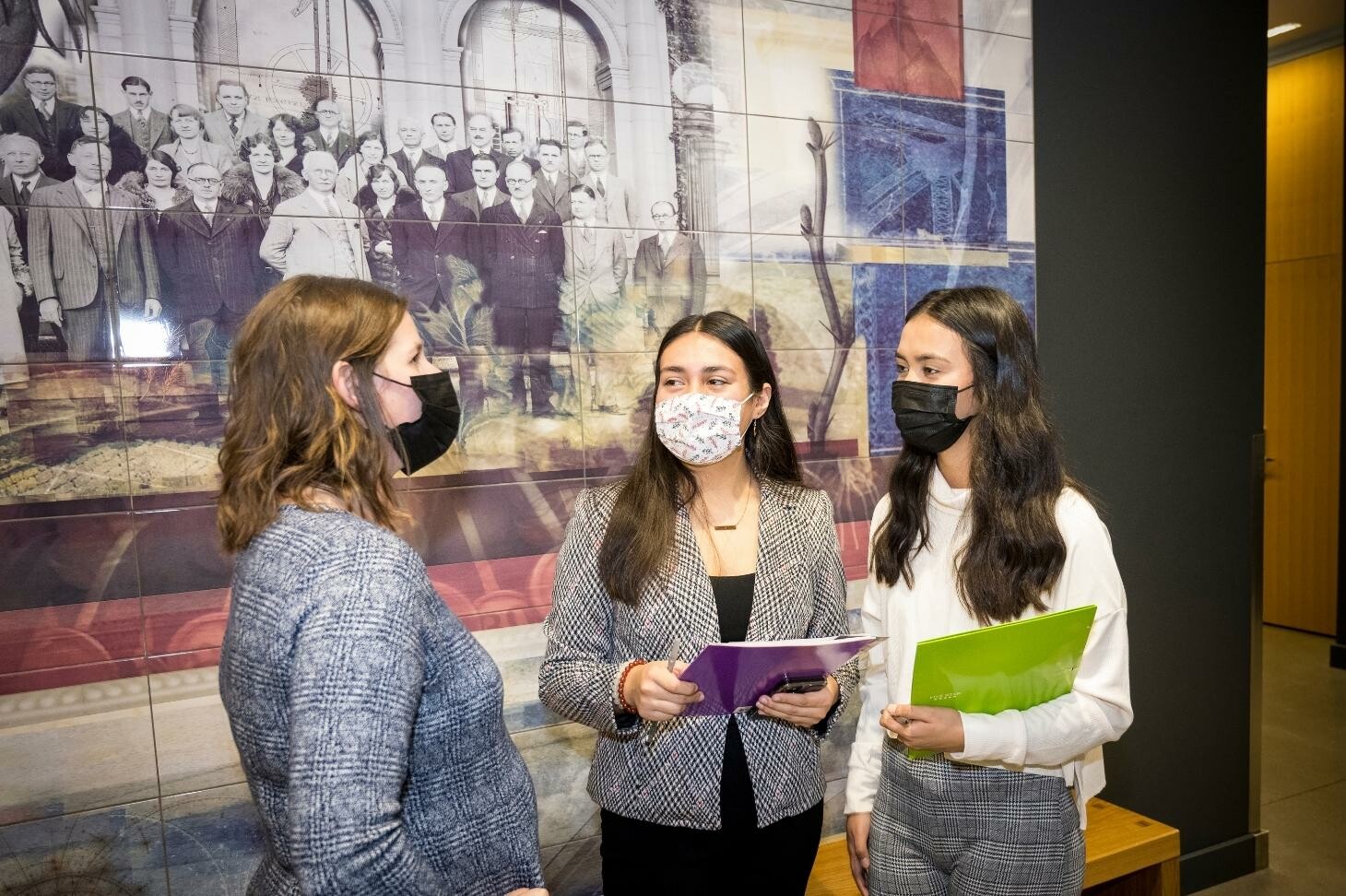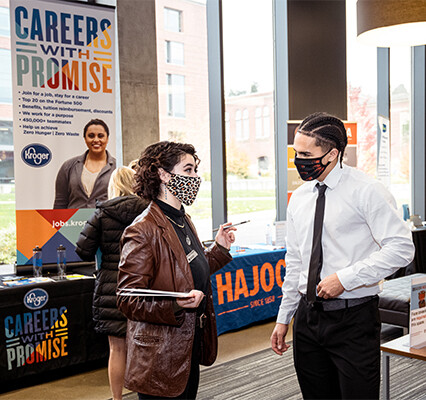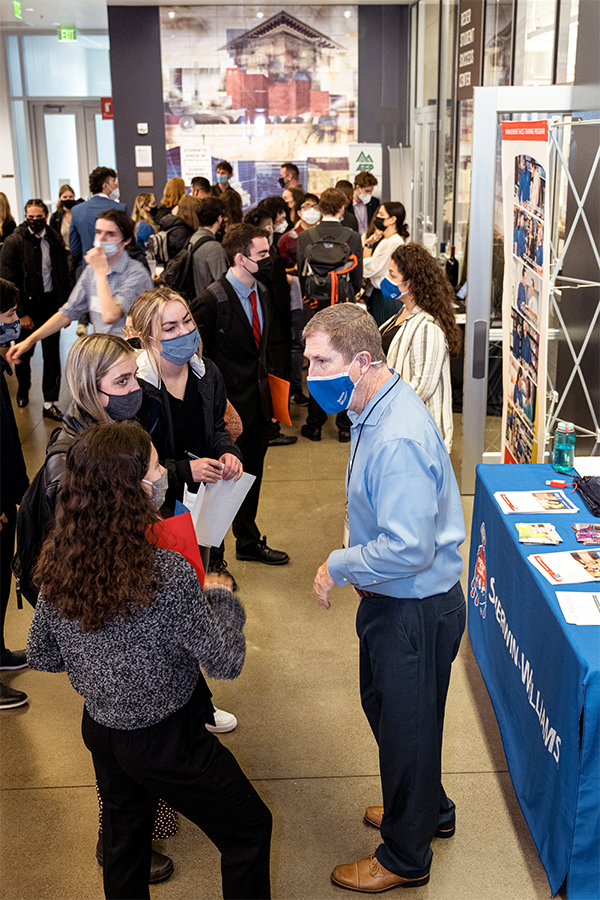News, articles, and interesting stuff from the College of Business
Grant Funding Helped the College of Business Expand its Blueprint Program

In 2019, the College of Business’s student engagement team was two years into Blueprint, an innovative approach bringing vital soft-skills training, career readiness and financial literacy to all first- and second-year students.
It was timely work.
The Pew Research Center, in their 2016 “The State of American Jobs” report, noted that employment in jobs that required skills like communication and critical thinking in tandem with technical skills rose by 83% from 1980 to 2015.
The shift was projected to continue, and it was something Prem Mathew, the College of Business’ associate dean for undergraduate student development, had his eye on.
“So much research indicates that there’s a gap between what employers look for and what students have,” Mathew said. “That’s the gap we were trying to fill.”

Blueprint was answering that need.
Nearly 90% of students who participated in the first year of Blueprint programming in the 2016 and 2017 school years came back for their second year, compared to an average of 78% nationwide. Better student retention is one of the student engagement team’s goals.
The team, headed by Executive Director of Student Engagement Sandy Neubaum, was already working on building the program out for third- and fourth-year students. What they wanted, Mathew said, was a way to do it robustly.
That’s where the Strada Education Network came in. In February 2019, Strada awarded the College of Business a $775,000 grant to expand the program and provide further support to low-income students.
“The funding Strada provided helped us set up the third- and fourth-year courses from an instructional funding perspective while ensuring results for career support,” Mathew said. “The third year is foundational for career readiness, and the fourth is really important for placement. Strada support helped us to refine the third-year curriculum and complete the fourth.”
Building the third- and fourth-year Blueprint curriculum meant developing six experiential career preparatory and financial literacy courses, as well as activities in collaboration with the Career Success Center that would help place students in jobs and internships, allow them to network with more than 450 employers yearly and give them the opportunity to become mentors to their peers.
The Strada grant also helped the student engagement team fund initiatives that bring more historically underserved and low-income students into the college, like business-oriented summer camps for high schoolers, renewable scholarships as well as emergency scholarship support for students in need. This nimbleness was critical when COVID-19 hit.
“During the pandemic, we noticed retention dropping, and created an intentional outreach plan to help students get through it, including emergency scholarships,” said Lauren Caruso, an assistant director in student engagement who works with transfer students as well as assessment and retention. “It’s wonderful to work at an institution and college where we have the means to support our students, and for them to feel connected enough to us to tell us when ‘life happens.’”
During the 2020-21 school year, Strada funding enabled the college to give out $2,500 a week in emergency scholarships, which often helped students cover basic expenses like rent and food and stay in school.
From 2017-2020, the college maintained a retention rate of nearly 90% for students who started Blueprint in their first year of college and then returned for the second year.
Graduation rates have also risen: 71% of students who began college from 2011-2015 graduated in six years, compared to 67.5% in prior years.
Much of what makes Blueprint successful — and unique — is how integrated student support is to the College of Business experience.
“I always tell students that talent is important but overrated, and that attitude and being a team player matter the most.”
Tim Cavanagh, Portland District City Manager, Sherwin Williams
“Our curricular structure is really different from what institutions do elsewhere,” Mathew said. “We don’t have the same siloes, and that helps the program be successful. I don’t know that any institution is doing this at this scale elsewhere in the country.”
The student engagement and academic advising teams work in partnership, for example. “Students develop an academic plan as a part of a Blueprint class assignment,” he said. “They share it with advisors to make sure that everything makes sense from a professional perspective.”
Students also self-report grades across courses in their first year, then report on them as a Blueprint assignment.
“It allows us to find students who might be struggling for different reasons, so we can find the right way to support them,” Mathew said.
Blueprint’s coursework is also integrated into the work the college’s Career Success Center does. Events at which students interact with professionals, like career fairs and guest lectures, are required as a part of class assignments.
“Blueprint is for all students,” said Jennifer Villalobos, a program manager and instructor on the college’s student engagement team. “But if you don’t make its components compulsory then the students who need it the most may not participate. First-generation students might not know how important these opportunities are, for example.”
As they progress through Blueprint courses, students become well-versed in business disciplines and develop a good foundation in financial literacy. They have picked up desired skills like adaptability, communication and teamwork along the way.
“In the Career Success Center, we hold workshops, talk with students one-on-one, hold career fairs and create employer events,” Villalobos said. “All of it is a collaboration with the Blueprint team. We can create awesome experiences for students to practice lifelong learning.”
It shows with employers.

“College of Business students are prepared. They’re on point with professionalism and preparation,” said Tim Cavanagh ‘88, the Portland district city manager at Sherwin Williams and a member of the college’s Career Success Center advisory council. “They’re really engaged in the process of what it will take to transition into the professional world. They’re learning that if you want to go to work in the business world you have to bring your A-game.”
Cavanagh has recruited at job fairs on college campuses regionally, as well as at OSU and in the College of Business. He also has participated as an industry partner in developing the Blueprint curriculum.
“College of Business students communicate well and show readiness to be on a team,” he said. “It one-hundred percent sets the College of Business apart. I always tell students that talent is important but overrated, and that attitude and being a team player matter the most.”
Since 2016, the number of College of Business students placed in internships while in school has risen from 61% to 80%. While the percentage of students placed in jobs within six months of graduating took a hit during the pandemic, average salaries have risen more than $3,000 a year since 2016.
As he contemplates how he wants Blueprint to look in the future, Mathew thinks about solidifying the career-readiness curriculum with input from employers themselves.
“The feedback loop I’m waiting for is from employers. It will be valuable to learn from them, so we can iterate upon our own successes,” Mathew said.
The student engagement team, including Caruso and Villalobos, are keen to keep polishing Blueprint and refining it so that it can better serve every student in the program.
“We want to continue to tailor what we offer to different student populations, traditional and nontraditional, folks who own their own businesses, military, parents,” Caruso said. “I am proud to be on a team that has been incredibly adaptable and willing to work toward meeting students’ needs and make changes accordingly.”
For Mathew, it’s exciting to think of where Blueprint can go, especially if further grant money or gifts become available.
“There are so many really good things to do. We’d love to continue them moving forward,” he said.